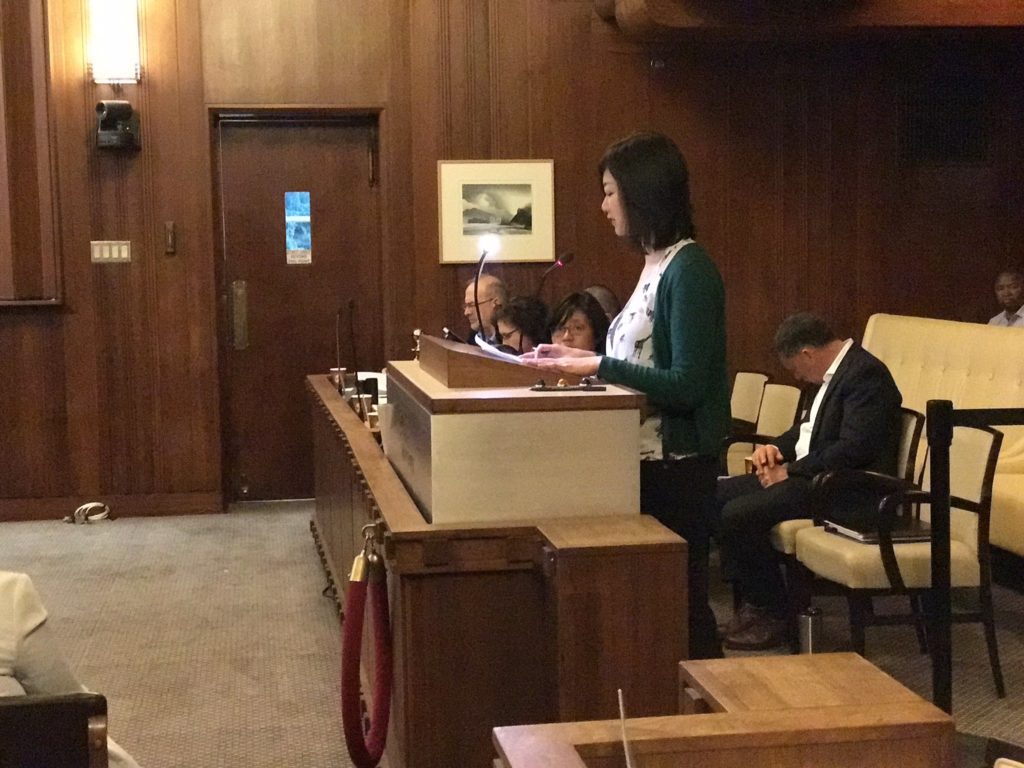
We would rather have a vacant lot than another condo development

We join Chinatown residents and groups in united opposition against Beedie Living’s proposed condo tower at the 105 Keefer site.
This proposed development will not benefit Chinatown. It is clear that Beedie’s primary objective is to maximize profits by giving the least possible benefits back to the neighbourhood. Beedie stands to make enormous profits from the sale of 110 condos units, but will not provide any units of affordable housing at welfare rates. The seniors cultural space will be a private space that has to be rented, and is available only to a few select groups. For the community, we will lose not only an important cultural site in Chinatown, but also the potential to obtain affordable housing and amenities that the Chinese seniors and other low-income people desperately need in Chinatown.
We would rather have a vacant lot than more condo developments that would increase rents and displacement pressures in the neighbourhood. The Woodward’s development led to the loss of over 400 units of low-income affordable housing in a one-block radius alone. In Chinatown, we are already seeing rents and costs of living steadily increasing as condo developments were built these past few years. More condos at 105 Keefer will have a devastating impact on Chinatown.
It’s important to remember that the fight for 105 Keefer cannot be separated from the long history of racism, dispossession, and displacement on this site. It was first the site of forced displacement of Coast Salish communities in the 1800’s, and later became a place of safety for Chinese workers from racism and exclusion in the city. This legacy continues today, as Chinatown continues to be a place of safety and belonging for Chinese seniors, new immigrants, and other low-income people.
Many of these residents have worked all their lives, often doing manual labour in the service industry or caring for children and elderly. And even when they are no longer able to work, they continue to take care of their friends, neighbours, and buildings in Chinatown. It is their paid and unpaid labour that upholds the foundation of this neighbourhood. They are the heart and soul of Chinatown.
But they are also the first to be evicted or priced out as rents and prices increase when market developments are built. As the local stores also get evicted or priced out of the neighbourhood, seniors have to travel farther and farther to meet their basic needs. New expensive retail spaces (like ones that will likely be in Beedie’s building) are places of exclusion that are unaffordable and not welcoming of low-income people.
These past several months, Chinatown Action Group has been on the streets and going door-to-door talking with these residents. We have heard from both Chinese residents and retail stores that they feel like they are intentionally being squeezed out of their own neighbourhood by being cut off from their basic needs, or made to feel so unwelcomed that they would be forced to leave.
Beedie reported that they had done many consultations in the community. I can tell you that many of the residents we spoke with are not even aware of the proposed 105 Keefer rezoning. Even if they received notification cards, many are not literate and can’t read Chinese or English. Many are not mobile enough to travel to open houses or to City Hall. And as we have seen with this Public Hearing, they only get half the time to speak as everyone else because they need English interpretation. There has been no interpretation of the proceedings into Cantonese and Mandarin for them, so they watch other people talk about their community and make decisions about it, but they are not privy to this information and cannot participate equally.
Is this how a society should treat its seniors?
This is not only about Chinatown’s heritage; this is about social justice for its people and the right to remain and age in place. This is about the right to participate in decisions about your neighbourhood.
Out of this history of racism and exclusion in Chinatown, we stand with our 婆婆and 爺爺 (our grandmas and grandpas), as well as our Indigenous friends and low-income neighbours who call Chinatown home. We carry on the neighbourhood’s history of resistance and resilience against discrimination and previous attempts to remove us.
For me, I fight for Chinatown because it is the place that grounds me in my culture and my identity. I am grateful for the Chinatown seniors who so patiently pass on their knowledge and stories to me, who are helping me learn my language and my history. When a senior is displaced from Chinatown, the whole community loses.
As the City of Vancouver is making efforts towards reconciliation for historical discrimination against Chinese people, we remind the City that the history of displacement and exclusion of Chinese voices cannot be repeated today. We demand that the City end the cycle of displacement of Chinese and other low-income people in Chinatown. Chinatown seniors, youth, residents, and organizations have come out in opposition to Beedie’s proposed condo tower at this site since 2014, and our voices cannot be made invisible. This is an opportunity for the City to demonstrate accountability towards us, to show that we no longer live in a time when our voices are silenced and the needs of our community are ignored.
We call on the City to put people before profits and reject the rezoning application. Instead, we ask that they work with the provincial and federal governments to build 100% social housing at welfare rates and publicly-accessible community space on this site.
